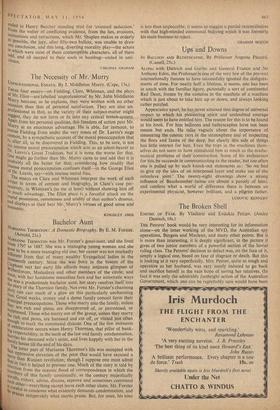. Bachelor Aunt MARIANNE THORNTON: A Domestic Biography. By E.
M. Forster. (Arnold, 21s.) MARIANNE THORNTON: A Domestic Biography. By E. M. Forster. (Arnold, 21s.) MARIANNE -IANNE THORNTON was Mr. Forster's great-aunt, and she lived :" 1797 to 1887. She was a managing young woman and she rwi to be a more managing old one; her career was not markedly erent from that of many wealthy Evangelical ladies in the 1!frlineteenth century. Since she was born in the bosom of the (, ,„al'ham sect her early life affords many intimate glimpses of nillberforces, Macaulays and other members of the circle; and 411' ,Ice, with her handsome masculine face and her autocratic ways e Was a predestinate bachelor aunt, her story resolves itself into 'hepiety Story of the Thornton fkmily. Not even Mr. Forster's charming can cast much of a glow on this particularly uncharming '44. Good works, money and a dense family conceit form their principal they are Those who marry into the family., unless .'.cY are rich and pious, are disapproved of, or patronised, or t'll:Ppressed. Those who marry out of the group, unless they marry eile rich and pious, are harassed and cut off, or visited just often f to mark the communal distaste. One of the few moments exhilaration occurs when Henry Thornton, that pillar of bank- nig, respectability, in the teeth of the law and family condemnation, ramity house till the end of his days. r_he latter part of Marianne Thornton's life was occupied with 41041 oPpressive elevation of the poor that would have excused a ftha,e, than Russian revolution; though I suppose one must admit at In fact it helped to prevent one. Much of the story is told by Umbers from the oceanic flood of correspondence in which the 44111,bers of this family continually, as the century majestically tii_Plts, exhort, advise, discuss, reprove and sometimes commend is eql. other—everything except leave each other alone. Mr. Forster he 'ireful to condemn what evidently demands condemnation, and
Praises temperately what merits praise. But, for once, his tone is less than impeccable; it seems to suggest a partial reconciliation with that high-minded communal bullying which it was formerly his main business to reject.
GRAHAM HOUGH


































 Previous page
Previous page